ENTREPRENEURSHIP AND SMALL BUSINESS MANAGEMENT - Semester Report
VerifiedAdded on 2020/01/23
|15
|4450
|114
Report
AI Summary
This report delves into the multifaceted world of entrepreneurship and small business management, examining different types of entrepreneurial ventures such as survival, managed growth, aggressive growth, and lifestyle ventures. It explores the relationships between these ventures and entrepreneurship typologies, highlighting similarities and differences. The report emphasizes the critical role of micro and small businesses in the UK economy, detailing their classification and impact, and analyzes the significance of local businesses and regional start-ups in fostering a robust social economy. Furthermore, the assignment provides a comparative analysis between the characteristics of successful entrepreneurs and managers, assesses the influences of entrepreneurial personality on motivation, and discusses how background and experience can both enable and hinder entrepreneurial endeavors. The report underscores the importance of entrepreneurial skills for improving business performance and offers insights into strategic approaches for business development and innovation.
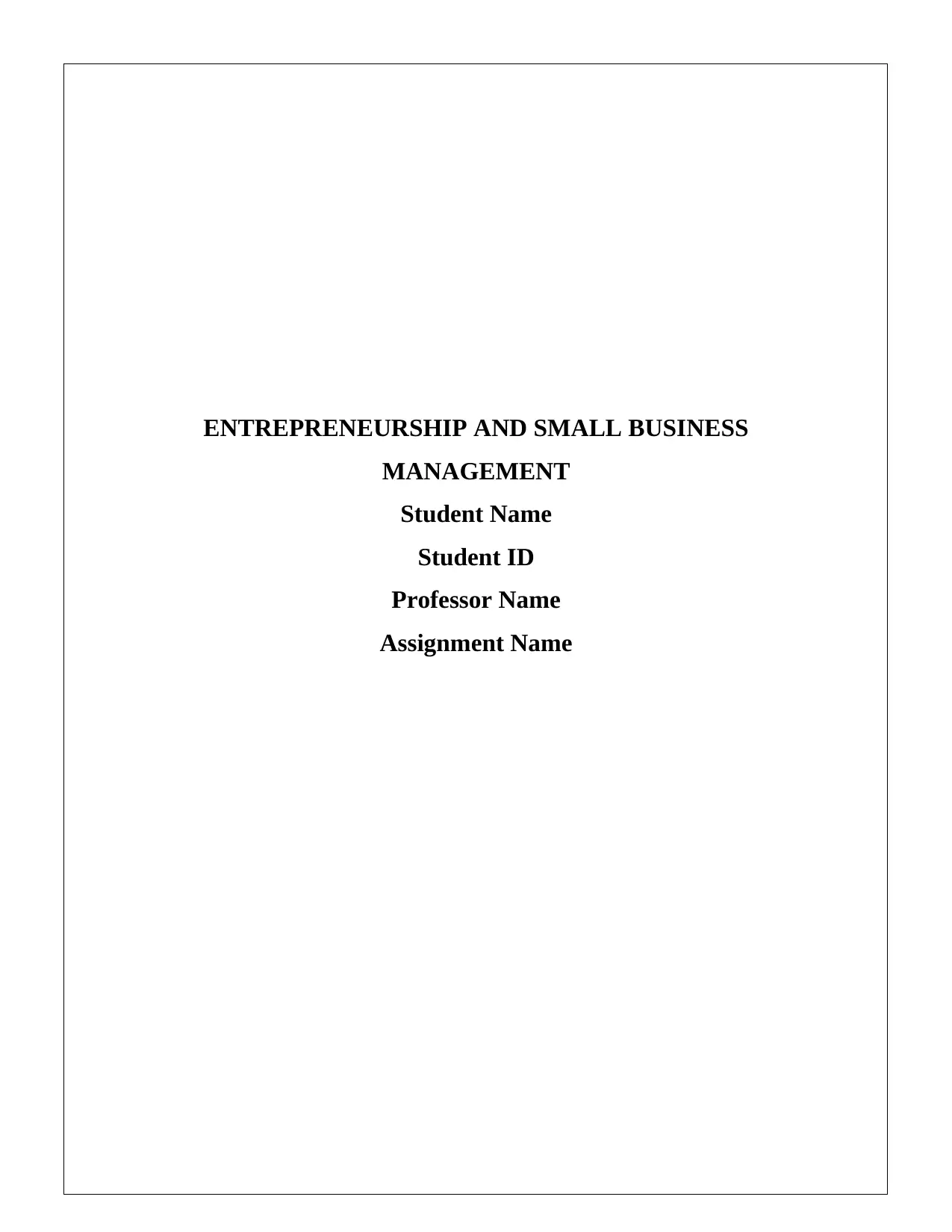
ENTREPRENEURSHIP AND SMALL BUSINESS
MANAGEMENT
Student Name
Student ID
Professor Name
Assignment Name
MANAGEMENT
Student Name
Student ID
Professor Name
Assignment Name
Paraphrase This Document
Need a fresh take? Get an instant paraphrase of this document with our AI Paraphraser
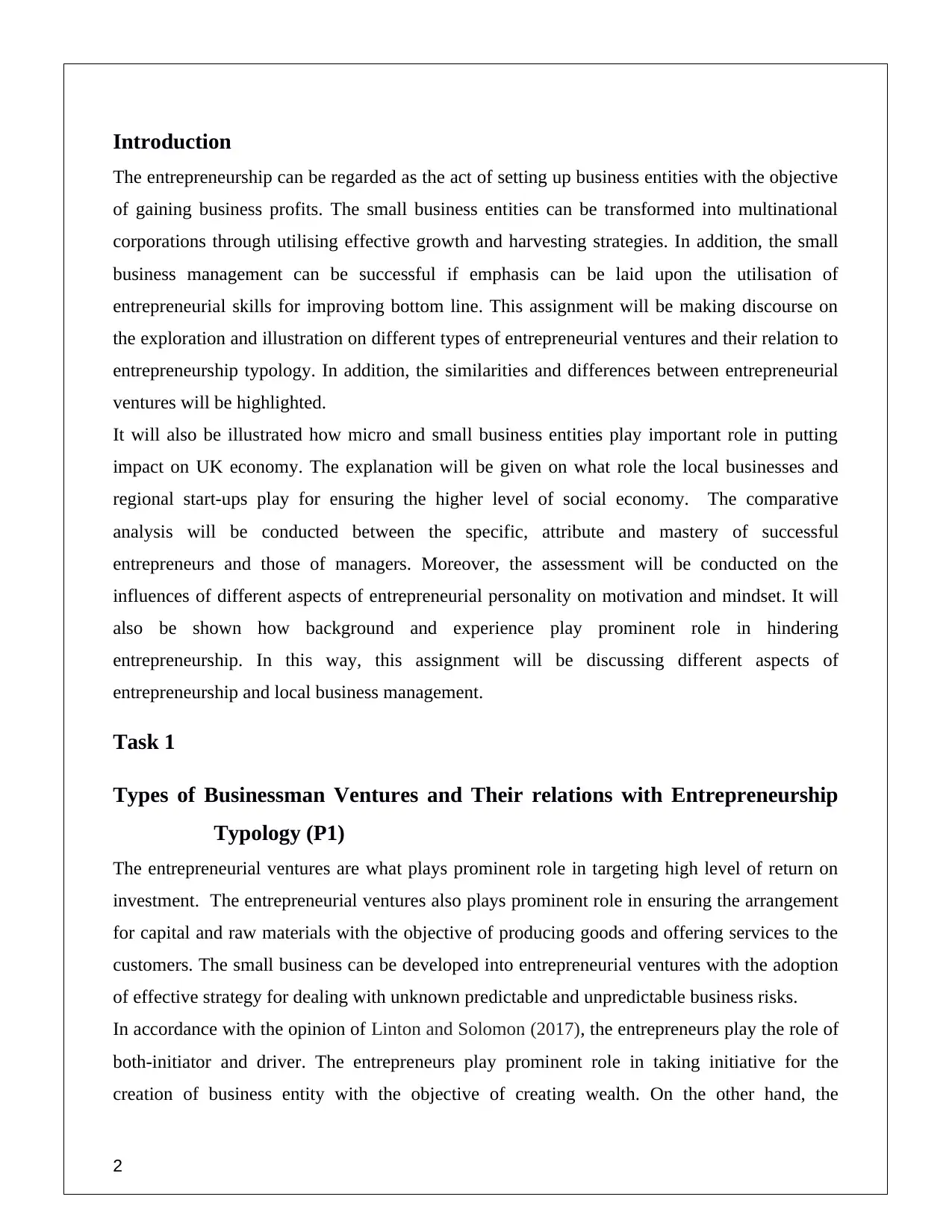
Introduction
The entrepreneurship can be regarded as the act of setting up business entities with the objective
of gaining business profits. The small business entities can be transformed into multinational
corporations through utilising effective growth and harvesting strategies. In addition, the small
business management can be successful if emphasis can be laid upon the utilisation of
entrepreneurial skills for improving bottom line. This assignment will be making discourse on
the exploration and illustration on different types of entrepreneurial ventures and their relation to
entrepreneurship typology. In addition, the similarities and differences between entrepreneurial
ventures will be highlighted.
It will also be illustrated how micro and small business entities play important role in putting
impact on UK economy. The explanation will be given on what role the local businesses and
regional start-ups play for ensuring the higher level of social economy. The comparative
analysis will be conducted between the specific, attribute and mastery of successful
entrepreneurs and those of managers. Moreover, the assessment will be conducted on the
influences of different aspects of entrepreneurial personality on motivation and mindset. It will
also be shown how background and experience play prominent role in hindering
entrepreneurship. In this way, this assignment will be discussing different aspects of
entrepreneurship and local business management.
Task 1
Types of Businessman Ventures and Their relations with Entrepreneurship
Typology (P1)
The entrepreneurial ventures are what plays prominent role in targeting high level of return on
investment. The entrepreneurial ventures also plays prominent role in ensuring the arrangement
for capital and raw materials with the objective of producing goods and offering services to the
customers. The small business can be developed into entrepreneurial ventures with the adoption
of effective strategy for dealing with unknown predictable and unpredictable business risks.
In accordance with the opinion of Linton and Solomon (2017), the entrepreneurs play the role of
both-initiator and driver. The entrepreneurs play prominent role in taking initiative for the
creation of business entity with the objective of creating wealth. On the other hand, the
2
The entrepreneurship can be regarded as the act of setting up business entities with the objective
of gaining business profits. The small business entities can be transformed into multinational
corporations through utilising effective growth and harvesting strategies. In addition, the small
business management can be successful if emphasis can be laid upon the utilisation of
entrepreneurial skills for improving bottom line. This assignment will be making discourse on
the exploration and illustration on different types of entrepreneurial ventures and their relation to
entrepreneurship typology. In addition, the similarities and differences between entrepreneurial
ventures will be highlighted.
It will also be illustrated how micro and small business entities play important role in putting
impact on UK economy. The explanation will be given on what role the local businesses and
regional start-ups play for ensuring the higher level of social economy. The comparative
analysis will be conducted between the specific, attribute and mastery of successful
entrepreneurs and those of managers. Moreover, the assessment will be conducted on the
influences of different aspects of entrepreneurial personality on motivation and mindset. It will
also be shown how background and experience play prominent role in hindering
entrepreneurship. In this way, this assignment will be discussing different aspects of
entrepreneurship and local business management.
Task 1
Types of Businessman Ventures and Their relations with Entrepreneurship
Typology (P1)
The entrepreneurial ventures are what plays prominent role in targeting high level of return on
investment. The entrepreneurial ventures also plays prominent role in ensuring the arrangement
for capital and raw materials with the objective of producing goods and offering services to the
customers. The small business can be developed into entrepreneurial ventures with the adoption
of effective strategy for dealing with unknown predictable and unpredictable business risks.
In accordance with the opinion of Linton and Solomon (2017), the entrepreneurs play the role of
both-initiator and driver. The entrepreneurs play prominent role in taking initiative for the
creation of business entity with the objective of creating wealth. On the other hand, the
2
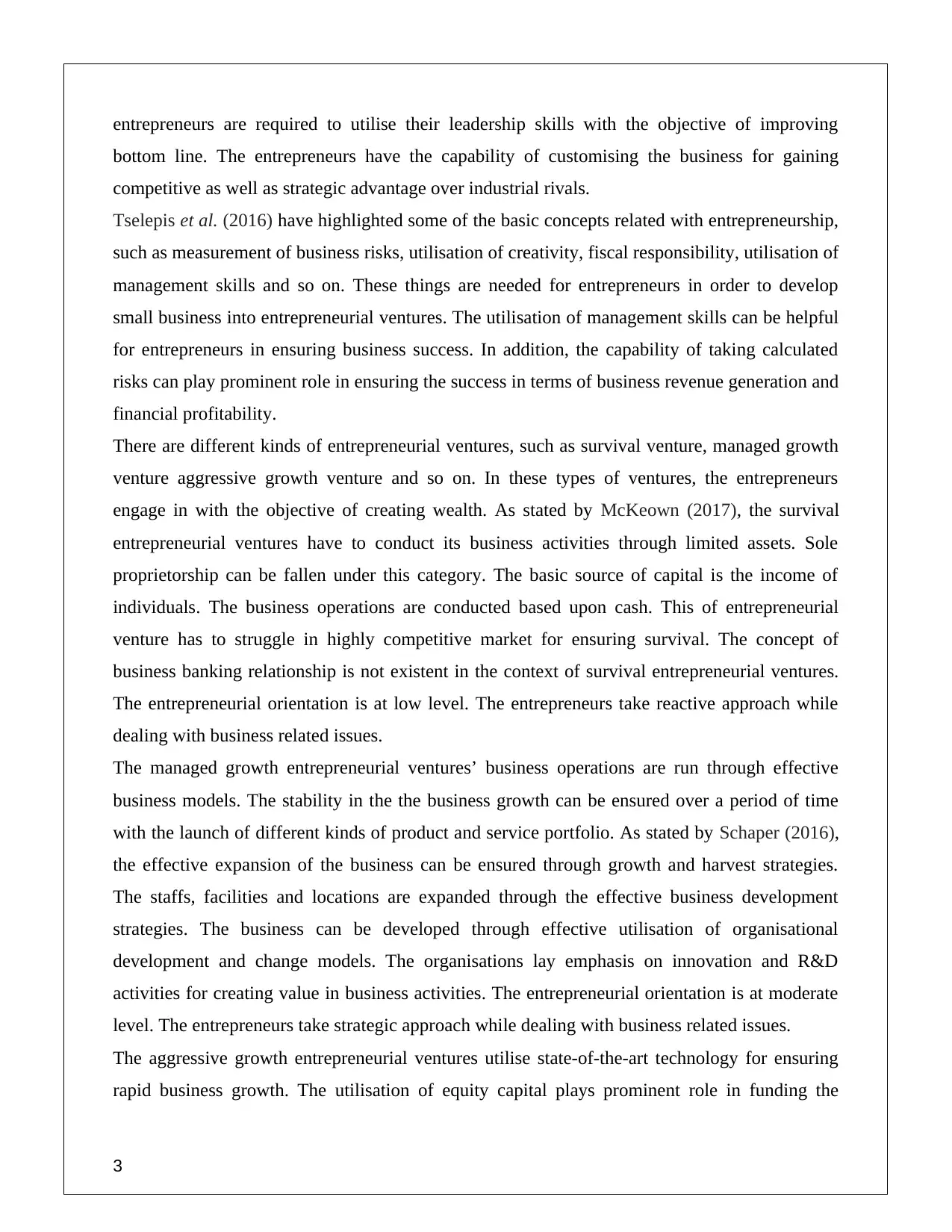
entrepreneurs are required to utilise their leadership skills with the objective of improving
bottom line. The entrepreneurs have the capability of customising the business for gaining
competitive as well as strategic advantage over industrial rivals.
Tselepis et al. (2016) have highlighted some of the basic concepts related with entrepreneurship,
such as measurement of business risks, utilisation of creativity, fiscal responsibility, utilisation of
management skills and so on. These things are needed for entrepreneurs in order to develop
small business into entrepreneurial ventures. The utilisation of management skills can be helpful
for entrepreneurs in ensuring business success. In addition, the capability of taking calculated
risks can play prominent role in ensuring the success in terms of business revenue generation and
financial profitability.
There are different kinds of entrepreneurial ventures, such as survival venture, managed growth
venture aggressive growth venture and so on. In these types of ventures, the entrepreneurs
engage in with the objective of creating wealth. As stated by McKeown (2017), the survival
entrepreneurial ventures have to conduct its business activities through limited assets. Sole
proprietorship can be fallen under this category. The basic source of capital is the income of
individuals. The business operations are conducted based upon cash. This of entrepreneurial
venture has to struggle in highly competitive market for ensuring survival. The concept of
business banking relationship is not existent in the context of survival entrepreneurial ventures.
The entrepreneurial orientation is at low level. The entrepreneurs take reactive approach while
dealing with business related issues.
The managed growth entrepreneurial ventures’ business operations are run through effective
business models. The stability in the the business growth can be ensured over a period of time
with the launch of different kinds of product and service portfolio. As stated by Schaper (2016),
the effective expansion of the business can be ensured through growth and harvest strategies.
The staffs, facilities and locations are expanded through the effective business development
strategies. The business can be developed through effective utilisation of organisational
development and change models. The organisations lay emphasis on innovation and R&D
activities for creating value in business activities. The entrepreneurial orientation is at moderate
level. The entrepreneurs take strategic approach while dealing with business related issues.
The aggressive growth entrepreneurial ventures utilise state-of-the-art technology for ensuring
rapid business growth. The utilisation of equity capital plays prominent role in funding the
3
bottom line. The entrepreneurs have the capability of customising the business for gaining
competitive as well as strategic advantage over industrial rivals.
Tselepis et al. (2016) have highlighted some of the basic concepts related with entrepreneurship,
such as measurement of business risks, utilisation of creativity, fiscal responsibility, utilisation of
management skills and so on. These things are needed for entrepreneurs in order to develop
small business into entrepreneurial ventures. The utilisation of management skills can be helpful
for entrepreneurs in ensuring business success. In addition, the capability of taking calculated
risks can play prominent role in ensuring the success in terms of business revenue generation and
financial profitability.
There are different kinds of entrepreneurial ventures, such as survival venture, managed growth
venture aggressive growth venture and so on. In these types of ventures, the entrepreneurs
engage in with the objective of creating wealth. As stated by McKeown (2017), the survival
entrepreneurial ventures have to conduct its business activities through limited assets. Sole
proprietorship can be fallen under this category. The basic source of capital is the income of
individuals. The business operations are conducted based upon cash. This of entrepreneurial
venture has to struggle in highly competitive market for ensuring survival. The concept of
business banking relationship is not existent in the context of survival entrepreneurial ventures.
The entrepreneurial orientation is at low level. The entrepreneurs take reactive approach while
dealing with business related issues.
The managed growth entrepreneurial ventures’ business operations are run through effective
business models. The stability in the the business growth can be ensured over a period of time
with the launch of different kinds of product and service portfolio. As stated by Schaper (2016),
the effective expansion of the business can be ensured through growth and harvest strategies.
The staffs, facilities and locations are expanded through the effective business development
strategies. The business can be developed through effective utilisation of organisational
development and change models. The organisations lay emphasis on innovation and R&D
activities for creating value in business activities. The entrepreneurial orientation is at moderate
level. The entrepreneurs take strategic approach while dealing with business related issues.
The aggressive growth entrepreneurial ventures utilise state-of-the-art technology for ensuring
rapid business growth. The utilisation of equity capital plays prominent role in funding the
3
⊘ This is a preview!⊘
Do you want full access?
Subscribe today to unlock all pages.

Trusted by 1+ million students worldwide
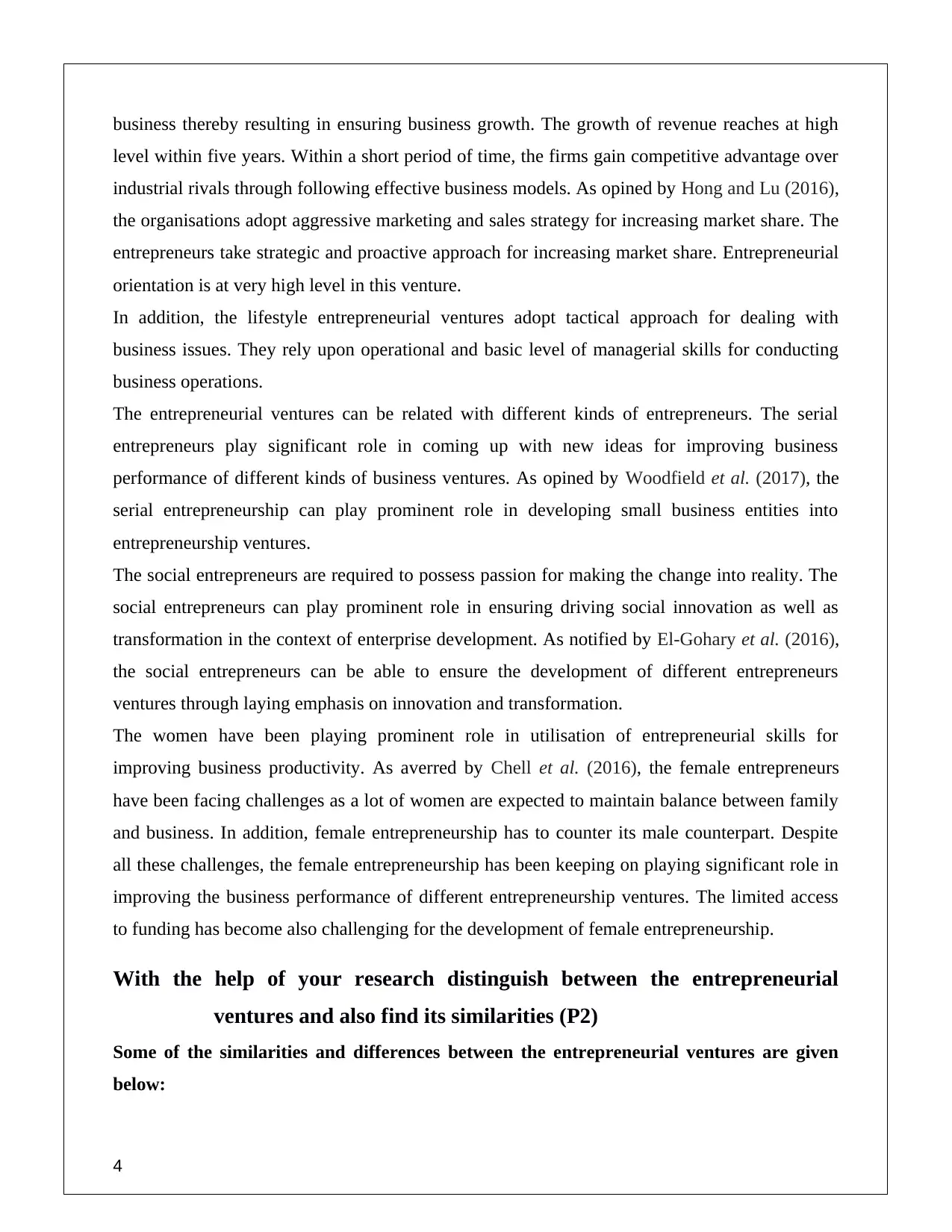
business thereby resulting in ensuring business growth. The growth of revenue reaches at high
level within five years. Within a short period of time, the firms gain competitive advantage over
industrial rivals through following effective business models. As opined by Hong and Lu (2016),
the organisations adopt aggressive marketing and sales strategy for increasing market share. The
entrepreneurs take strategic and proactive approach for increasing market share. Entrepreneurial
orientation is at very high level in this venture.
In addition, the lifestyle entrepreneurial ventures adopt tactical approach for dealing with
business issues. They rely upon operational and basic level of managerial skills for conducting
business operations.
The entrepreneurial ventures can be related with different kinds of entrepreneurs. The serial
entrepreneurs play significant role in coming up with new ideas for improving business
performance of different kinds of business ventures. As opined by Woodfield et al. (2017), the
serial entrepreneurship can play prominent role in developing small business entities into
entrepreneurship ventures.
The social entrepreneurs are required to possess passion for making the change into reality. The
social entrepreneurs can play prominent role in ensuring driving social innovation as well as
transformation in the context of enterprise development. As notified by El-Gohary et al. (2016),
the social entrepreneurs can be able to ensure the development of different entrepreneurs
ventures through laying emphasis on innovation and transformation.
The women have been playing prominent role in utilisation of entrepreneurial skills for
improving business productivity. As averred by Chell et al. (2016), the female entrepreneurs
have been facing challenges as a lot of women are expected to maintain balance between family
and business. In addition, female entrepreneurship has to counter its male counterpart. Despite
all these challenges, the female entrepreneurship has been keeping on playing significant role in
improving the business performance of different entrepreneurship ventures. The limited access
to funding has become also challenging for the development of female entrepreneurship.
With the help of your research distinguish between the entrepreneurial
ventures and also find its similarities (P2)
Some of the similarities and differences between the entrepreneurial ventures are given
below:
4
level within five years. Within a short period of time, the firms gain competitive advantage over
industrial rivals through following effective business models. As opined by Hong and Lu (2016),
the organisations adopt aggressive marketing and sales strategy for increasing market share. The
entrepreneurs take strategic and proactive approach for increasing market share. Entrepreneurial
orientation is at very high level in this venture.
In addition, the lifestyle entrepreneurial ventures adopt tactical approach for dealing with
business issues. They rely upon operational and basic level of managerial skills for conducting
business operations.
The entrepreneurial ventures can be related with different kinds of entrepreneurs. The serial
entrepreneurs play significant role in coming up with new ideas for improving business
performance of different kinds of business ventures. As opined by Woodfield et al. (2017), the
serial entrepreneurship can play prominent role in developing small business entities into
entrepreneurship ventures.
The social entrepreneurs are required to possess passion for making the change into reality. The
social entrepreneurs can play prominent role in ensuring driving social innovation as well as
transformation in the context of enterprise development. As notified by El-Gohary et al. (2016),
the social entrepreneurs can be able to ensure the development of different entrepreneurs
ventures through laying emphasis on innovation and transformation.
The women have been playing prominent role in utilisation of entrepreneurial skills for
improving business productivity. As averred by Chell et al. (2016), the female entrepreneurs
have been facing challenges as a lot of women are expected to maintain balance between family
and business. In addition, female entrepreneurship has to counter its male counterpart. Despite
all these challenges, the female entrepreneurship has been keeping on playing significant role in
improving the business performance of different entrepreneurship ventures. The limited access
to funding has become also challenging for the development of female entrepreneurship.
With the help of your research distinguish between the entrepreneurial
ventures and also find its similarities (P2)
Some of the similarities and differences between the entrepreneurial ventures are given
below:
4
Paraphrase This Document
Need a fresh take? Get an instant paraphrase of this document with our AI Paraphraser
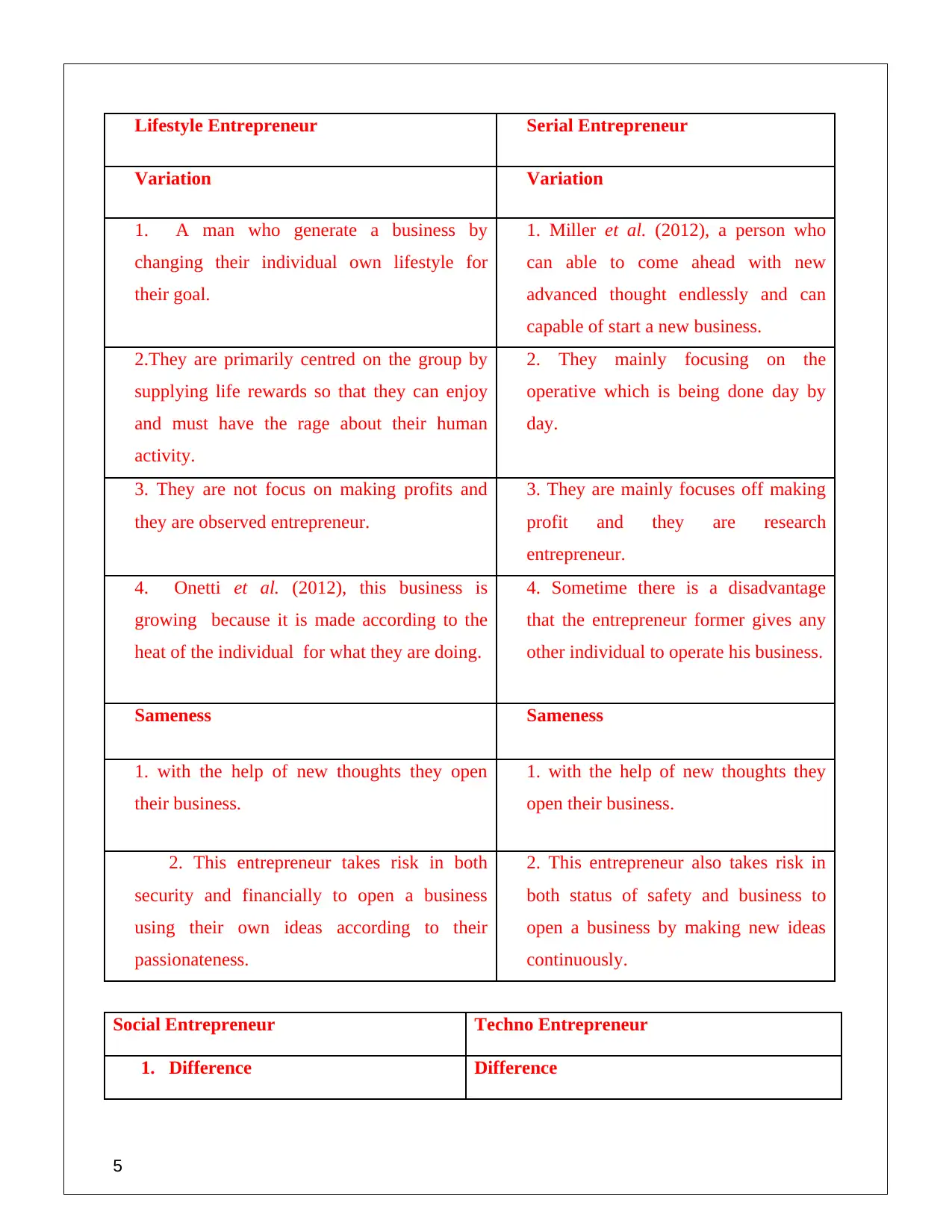
Lifestyle Entrepreneur Serial Entrepreneur
Variation Variation
1. A man who generate a business by
changing their individual own lifestyle for
their goal.
1. Miller et al. (2012), a person who
can able to come ahead with new
advanced thought endlessly and can
capable of start a new business.
2.They are primarily centred on the group by
supplying life rewards so that they can enjoy
and must have the rage about their human
activity.
2. They mainly focusing on the
operative which is being done day by
day.
3. They are not focus on making profits and
they are observed entrepreneur.
3. They are mainly focuses off making
profit and they are research
entrepreneur.
4. Onetti et al. (2012), this business is
growing because it is made according to the
heat of the individual for what they are doing.
4. Sometime there is a disadvantage
that the entrepreneur former gives any
other individual to operate his business.
Sameness Sameness
1. with the help of new thoughts they open
their business.
1. with the help of new thoughts they
open their business.
2. This entrepreneur takes risk in both
security and financially to open a business
using their own ideas according to their
passionateness.
2. This entrepreneur also takes risk in
both status of safety and business to
open a business by making new ideas
continuously.
Social Entrepreneur Techno Entrepreneur
1. Difference Difference
5
Variation Variation
1. A man who generate a business by
changing their individual own lifestyle for
their goal.
1. Miller et al. (2012), a person who
can able to come ahead with new
advanced thought endlessly and can
capable of start a new business.
2.They are primarily centred on the group by
supplying life rewards so that they can enjoy
and must have the rage about their human
activity.
2. They mainly focusing on the
operative which is being done day by
day.
3. They are not focus on making profits and
they are observed entrepreneur.
3. They are mainly focuses off making
profit and they are research
entrepreneur.
4. Onetti et al. (2012), this business is
growing because it is made according to the
heat of the individual for what they are doing.
4. Sometime there is a disadvantage
that the entrepreneur former gives any
other individual to operate his business.
Sameness Sameness
1. with the help of new thoughts they open
their business.
1. with the help of new thoughts they
open their business.
2. This entrepreneur takes risk in both
security and financially to open a business
using their own ideas according to their
passionateness.
2. This entrepreneur also takes risk in
both status of safety and business to
open a business by making new ideas
continuously.
Social Entrepreneur Techno Entrepreneur
1. Difference Difference
5
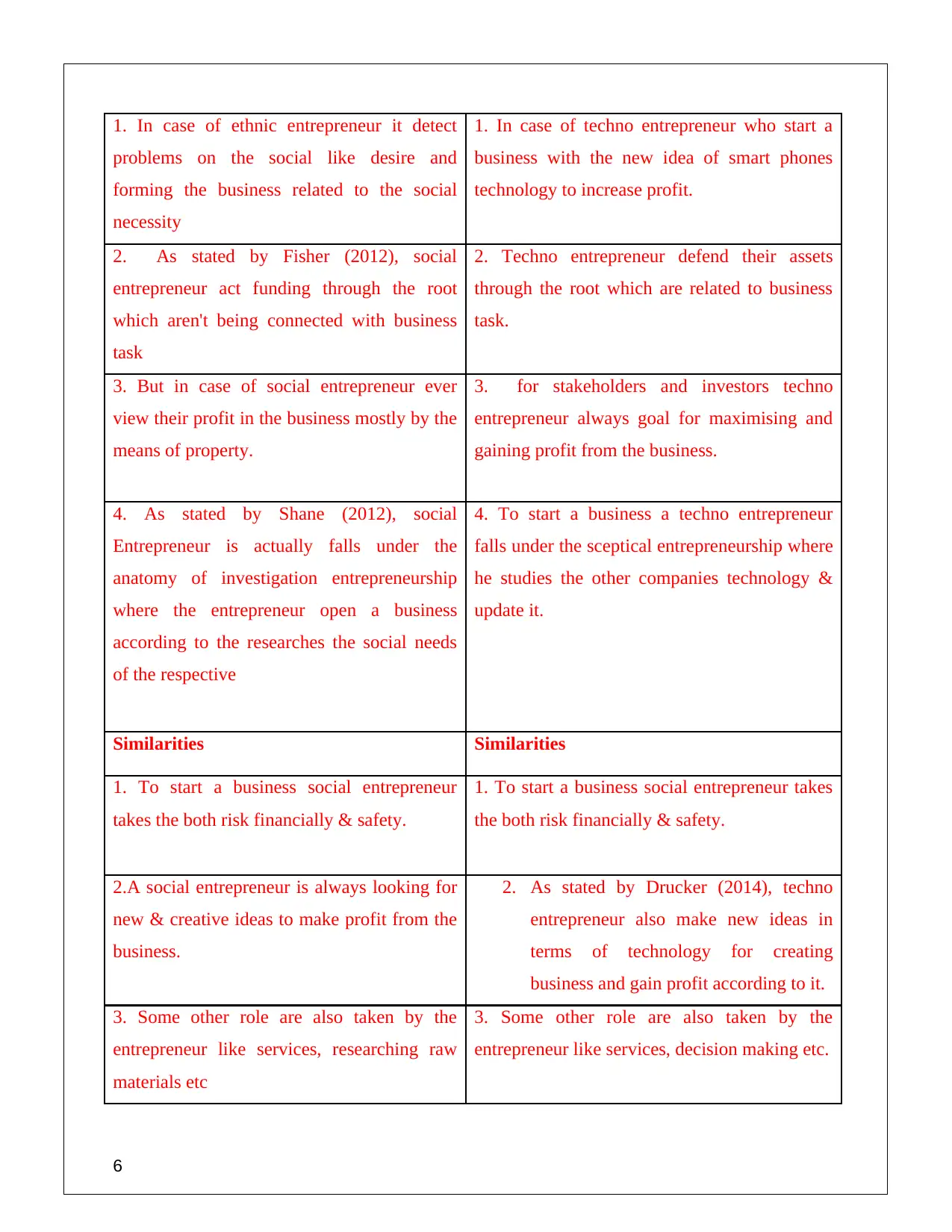
1. In case of ethnic entrepreneur it detect
problems on the social like desire and
forming the business related to the social
necessity
1. In case of techno entrepreneur who start a
business with the new idea of smart phones
technology to increase profit.
2. As stated by Fisher (2012), social
entrepreneur act funding through the root
which aren't being connected with business
task
2. Techno entrepreneur defend their assets
through the root which are related to business
task.
3. But in case of social entrepreneur ever
view their profit in the business mostly by the
means of property.
3. for stakeholders and investors techno
entrepreneur always goal for maximising and
gaining profit from the business.
4. As stated by Shane (2012), social
Entrepreneur is actually falls under the
anatomy of investigation entrepreneurship
where the entrepreneur open a business
according to the researches the social needs
of the respective
4. To start a business a techno entrepreneur
falls under the sceptical entrepreneurship where
he studies the other companies technology &
update it.
Similarities Similarities
1. To start a business social entrepreneur
takes the both risk financially & safety.
1. To start a business social entrepreneur takes
the both risk financially & safety.
2.A social entrepreneur is always looking for
new & creative ideas to make profit from the
business.
2. As stated by Drucker (2014), techno
entrepreneur also make new ideas in
terms of technology for creating
business and gain profit according to it.
3. Some other role are also taken by the
entrepreneur like services, researching raw
materials etc
3. Some other role are also taken by the
entrepreneur like services, decision making etc.
6
problems on the social like desire and
forming the business related to the social
necessity
1. In case of techno entrepreneur who start a
business with the new idea of smart phones
technology to increase profit.
2. As stated by Fisher (2012), social
entrepreneur act funding through the root
which aren't being connected with business
task
2. Techno entrepreneur defend their assets
through the root which are related to business
task.
3. But in case of social entrepreneur ever
view their profit in the business mostly by the
means of property.
3. for stakeholders and investors techno
entrepreneur always goal for maximising and
gaining profit from the business.
4. As stated by Shane (2012), social
Entrepreneur is actually falls under the
anatomy of investigation entrepreneurship
where the entrepreneur open a business
according to the researches the social needs
of the respective
4. To start a business a techno entrepreneur
falls under the sceptical entrepreneurship where
he studies the other companies technology &
update it.
Similarities Similarities
1. To start a business social entrepreneur
takes the both risk financially & safety.
1. To start a business social entrepreneur takes
the both risk financially & safety.
2.A social entrepreneur is always looking for
new & creative ideas to make profit from the
business.
2. As stated by Drucker (2014), techno
entrepreneur also make new ideas in
terms of technology for creating
business and gain profit according to it.
3. Some other role are also taken by the
entrepreneur like services, researching raw
materials etc
3. Some other role are also taken by the
entrepreneur like services, decision making etc.
6
⊘ This is a preview!⊘
Do you want full access?
Subscribe today to unlock all pages.

Trusted by 1+ million students worldwide
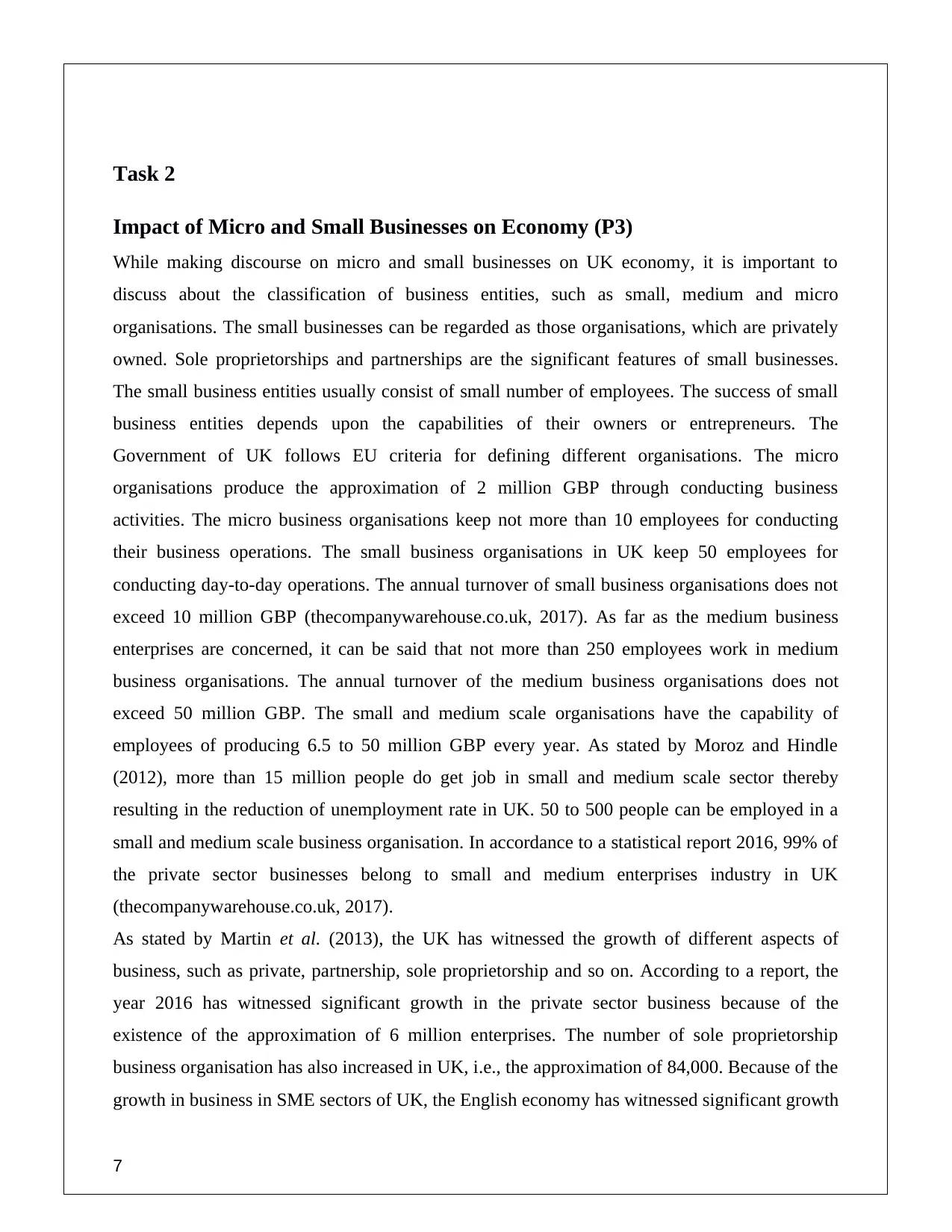
Task 2
Impact of Micro and Small Businesses on Economy (P3)
While making discourse on micro and small businesses on UK economy, it is important to
discuss about the classification of business entities, such as small, medium and micro
organisations. The small businesses can be regarded as those organisations, which are privately
owned. Sole proprietorships and partnerships are the significant features of small businesses.
The small business entities usually consist of small number of employees. The success of small
business entities depends upon the capabilities of their owners or entrepreneurs. The
Government of UK follows EU criteria for defining different organisations. The micro
organisations produce the approximation of 2 million GBP through conducting business
activities. The micro business organisations keep not more than 10 employees for conducting
their business operations. The small business organisations in UK keep 50 employees for
conducting day-to-day operations. The annual turnover of small business organisations does not
exceed 10 million GBP (thecompanywarehouse.co.uk, 2017). As far as the medium business
enterprises are concerned, it can be said that not more than 250 employees work in medium
business organisations. The annual turnover of the medium business organisations does not
exceed 50 million GBP. The small and medium scale organisations have the capability of
employees of producing 6.5 to 50 million GBP every year. As stated by Moroz and Hindle
(2012), more than 15 million people do get job in small and medium scale sector thereby
resulting in the reduction of unemployment rate in UK. 50 to 500 people can be employed in a
small and medium scale business organisation. In accordance to a statistical report 2016, 99% of
the private sector businesses belong to small and medium enterprises industry in UK
(thecompanywarehouse.co.uk, 2017).
As stated by Martin et al. (2013), the UK has witnessed the growth of different aspects of
business, such as private, partnership, sole proprietorship and so on. According to a report, the
year 2016 has witnessed significant growth in the private sector business because of the
existence of the approximation of 6 million enterprises. The number of sole proprietorship
business organisation has also increased in UK, i.e., the approximation of 84,000. Because of the
growth in business in SME sectors of UK, the English economy has witnessed significant growth
7
Impact of Micro and Small Businesses on Economy (P3)
While making discourse on micro and small businesses on UK economy, it is important to
discuss about the classification of business entities, such as small, medium and micro
organisations. The small businesses can be regarded as those organisations, which are privately
owned. Sole proprietorships and partnerships are the significant features of small businesses.
The small business entities usually consist of small number of employees. The success of small
business entities depends upon the capabilities of their owners or entrepreneurs. The
Government of UK follows EU criteria for defining different organisations. The micro
organisations produce the approximation of 2 million GBP through conducting business
activities. The micro business organisations keep not more than 10 employees for conducting
their business operations. The small business organisations in UK keep 50 employees for
conducting day-to-day operations. The annual turnover of small business organisations does not
exceed 10 million GBP (thecompanywarehouse.co.uk, 2017). As far as the medium business
enterprises are concerned, it can be said that not more than 250 employees work in medium
business organisations. The annual turnover of the medium business organisations does not
exceed 50 million GBP. The small and medium scale organisations have the capability of
employees of producing 6.5 to 50 million GBP every year. As stated by Moroz and Hindle
(2012), more than 15 million people do get job in small and medium scale sector thereby
resulting in the reduction of unemployment rate in UK. 50 to 500 people can be employed in a
small and medium scale business organisation. In accordance to a statistical report 2016, 99% of
the private sector businesses belong to small and medium enterprises industry in UK
(thecompanywarehouse.co.uk, 2017).
As stated by Martin et al. (2013), the UK has witnessed the growth of different aspects of
business, such as private, partnership, sole proprietorship and so on. According to a report, the
year 2016 has witnessed significant growth in the private sector business because of the
existence of the approximation of 6 million enterprises. The number of sole proprietorship
business organisation has also increased in UK, i.e., the approximation of 84,000. Because of the
growth in business in SME sectors of UK, the English economy has witnessed significant growth
7
Paraphrase This Document
Need a fresh take? Get an instant paraphrase of this document with our AI Paraphraser
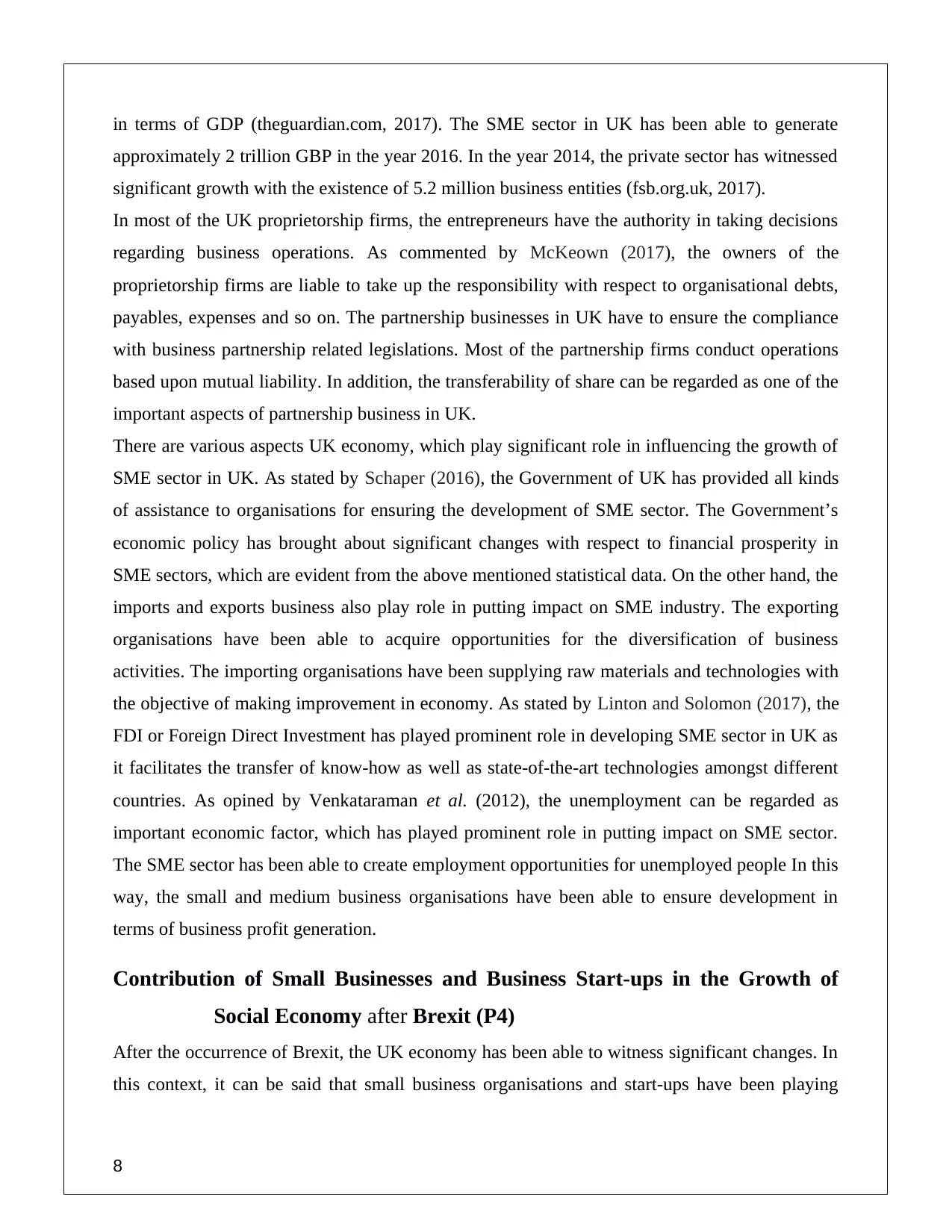
in terms of GDP (theguardian.com, 2017). The SME sector in UK has been able to generate
approximately 2 trillion GBP in the year 2016. In the year 2014, the private sector has witnessed
significant growth with the existence of 5.2 million business entities (fsb.org.uk, 2017).
In most of the UK proprietorship firms, the entrepreneurs have the authority in taking decisions
regarding business operations. As commented by McKeown (2017), the owners of the
proprietorship firms are liable to take up the responsibility with respect to organisational debts,
payables, expenses and so on. The partnership businesses in UK have to ensure the compliance
with business partnership related legislations. Most of the partnership firms conduct operations
based upon mutual liability. In addition, the transferability of share can be regarded as one of the
important aspects of partnership business in UK.
There are various aspects UK economy, which play significant role in influencing the growth of
SME sector in UK. As stated by Schaper (2016), the Government of UK has provided all kinds
of assistance to organisations for ensuring the development of SME sector. The Government’s
economic policy has brought about significant changes with respect to financial prosperity in
SME sectors, which are evident from the above mentioned statistical data. On the other hand, the
imports and exports business also play role in putting impact on SME industry. The exporting
organisations have been able to acquire opportunities for the diversification of business
activities. The importing organisations have been supplying raw materials and technologies with
the objective of making improvement in economy. As stated by Linton and Solomon (2017), the
FDI or Foreign Direct Investment has played prominent role in developing SME sector in UK as
it facilitates the transfer of know-how as well as state-of-the-art technologies amongst different
countries. As opined by Venkataraman et al. (2012), the unemployment can be regarded as
important economic factor, which has played prominent role in putting impact on SME sector.
The SME sector has been able to create employment opportunities for unemployed people In this
way, the small and medium business organisations have been able to ensure development in
terms of business profit generation.
Contribution of Small Businesses and Business Start-ups in the Growth of
Social Economy after Brexit (P4)
After the occurrence of Brexit, the UK economy has been able to witness significant changes. In
this context, it can be said that small business organisations and start-ups have been playing
8
approximately 2 trillion GBP in the year 2016. In the year 2014, the private sector has witnessed
significant growth with the existence of 5.2 million business entities (fsb.org.uk, 2017).
In most of the UK proprietorship firms, the entrepreneurs have the authority in taking decisions
regarding business operations. As commented by McKeown (2017), the owners of the
proprietorship firms are liable to take up the responsibility with respect to organisational debts,
payables, expenses and so on. The partnership businesses in UK have to ensure the compliance
with business partnership related legislations. Most of the partnership firms conduct operations
based upon mutual liability. In addition, the transferability of share can be regarded as one of the
important aspects of partnership business in UK.
There are various aspects UK economy, which play significant role in influencing the growth of
SME sector in UK. As stated by Schaper (2016), the Government of UK has provided all kinds
of assistance to organisations for ensuring the development of SME sector. The Government’s
economic policy has brought about significant changes with respect to financial prosperity in
SME sectors, which are evident from the above mentioned statistical data. On the other hand, the
imports and exports business also play role in putting impact on SME industry. The exporting
organisations have been able to acquire opportunities for the diversification of business
activities. The importing organisations have been supplying raw materials and technologies with
the objective of making improvement in economy. As stated by Linton and Solomon (2017), the
FDI or Foreign Direct Investment has played prominent role in developing SME sector in UK as
it facilitates the transfer of know-how as well as state-of-the-art technologies amongst different
countries. As opined by Venkataraman et al. (2012), the unemployment can be regarded as
important economic factor, which has played prominent role in putting impact on SME sector.
The SME sector has been able to create employment opportunities for unemployed people In this
way, the small and medium business organisations have been able to ensure development in
terms of business profit generation.
Contribution of Small Businesses and Business Start-ups in the Growth of
Social Economy after Brexit (P4)
After the occurrence of Brexit, the UK economy has been able to witness significant changes. In
this context, it can be said that small business organisations and start-ups have been playing
8
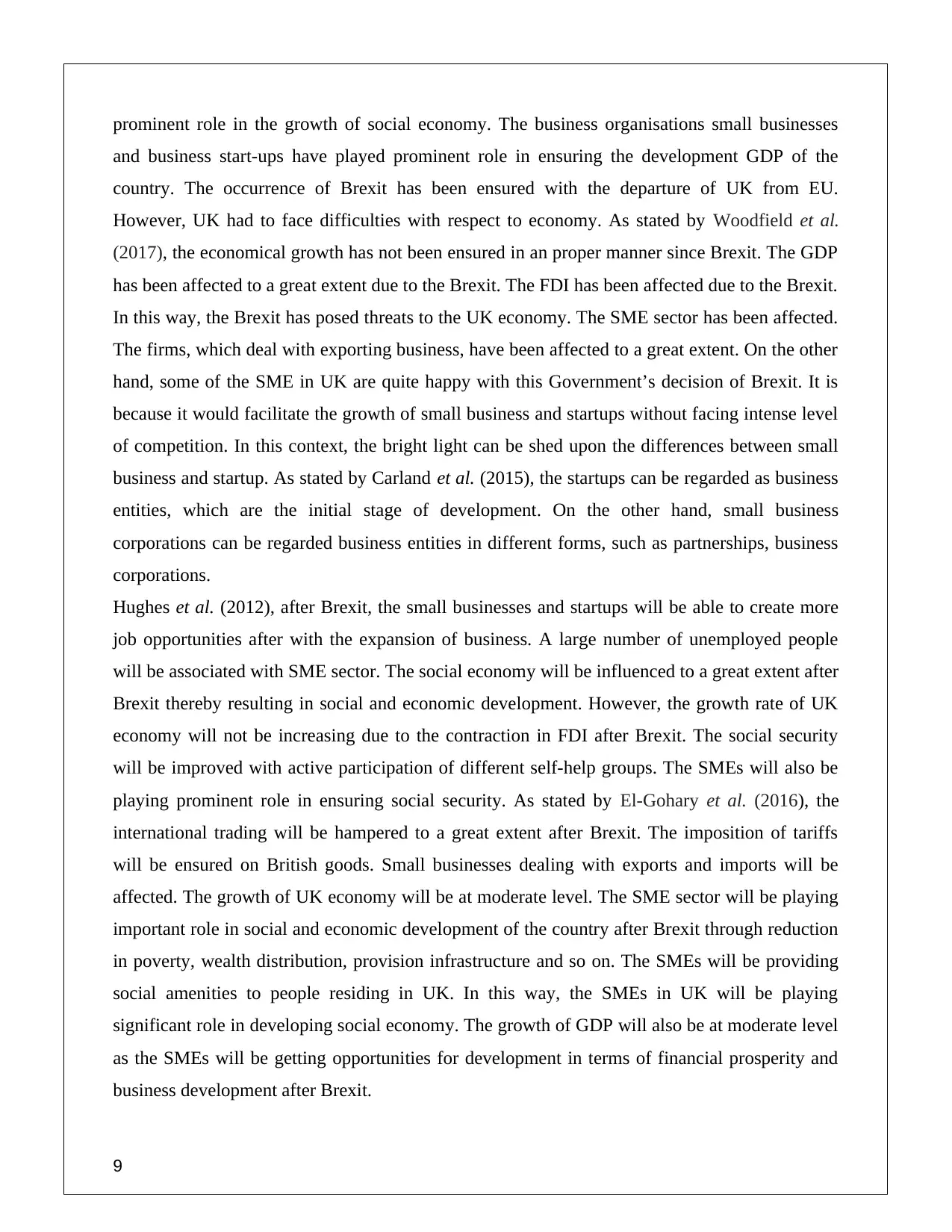
prominent role in the growth of social economy. The business organisations small businesses
and business start-ups have played prominent role in ensuring the development GDP of the
country. The occurrence of Brexit has been ensured with the departure of UK from EU.
However, UK had to face difficulties with respect to economy. As stated by Woodfield et al.
(2017), the economical growth has not been ensured in an proper manner since Brexit. The GDP
has been affected to a great extent due to the Brexit. The FDI has been affected due to the Brexit.
In this way, the Brexit has posed threats to the UK economy. The SME sector has been affected.
The firms, which deal with exporting business, have been affected to a great extent. On the other
hand, some of the SME in UK are quite happy with this Government’s decision of Brexit. It is
because it would facilitate the growth of small business and startups without facing intense level
of competition. In this context, the bright light can be shed upon the differences between small
business and startup. As stated by Carland et al. (2015), the startups can be regarded as business
entities, which are the initial stage of development. On the other hand, small business
corporations can be regarded business entities in different forms, such as partnerships, business
corporations.
Hughes et al. (2012), after Brexit, the small businesses and startups will be able to create more
job opportunities after with the expansion of business. A large number of unemployed people
will be associated with SME sector. The social economy will be influenced to a great extent after
Brexit thereby resulting in social and economic development. However, the growth rate of UK
economy will not be increasing due to the contraction in FDI after Brexit. The social security
will be improved with active participation of different self-help groups. The SMEs will also be
playing prominent role in ensuring social security. As stated by El-Gohary et al. (2016), the
international trading will be hampered to a great extent after Brexit. The imposition of tariffs
will be ensured on British goods. Small businesses dealing with exports and imports will be
affected. The growth of UK economy will be at moderate level. The SME sector will be playing
important role in social and economic development of the country after Brexit through reduction
in poverty, wealth distribution, provision infrastructure and so on. The SMEs will be providing
social amenities to people residing in UK. In this way, the SMEs in UK will be playing
significant role in developing social economy. The growth of GDP will also be at moderate level
as the SMEs will be getting opportunities for development in terms of financial prosperity and
business development after Brexit.
9
and business start-ups have played prominent role in ensuring the development GDP of the
country. The occurrence of Brexit has been ensured with the departure of UK from EU.
However, UK had to face difficulties with respect to economy. As stated by Woodfield et al.
(2017), the economical growth has not been ensured in an proper manner since Brexit. The GDP
has been affected to a great extent due to the Brexit. The FDI has been affected due to the Brexit.
In this way, the Brexit has posed threats to the UK economy. The SME sector has been affected.
The firms, which deal with exporting business, have been affected to a great extent. On the other
hand, some of the SME in UK are quite happy with this Government’s decision of Brexit. It is
because it would facilitate the growth of small business and startups without facing intense level
of competition. In this context, the bright light can be shed upon the differences between small
business and startup. As stated by Carland et al. (2015), the startups can be regarded as business
entities, which are the initial stage of development. On the other hand, small business
corporations can be regarded business entities in different forms, such as partnerships, business
corporations.
Hughes et al. (2012), after Brexit, the small businesses and startups will be able to create more
job opportunities after with the expansion of business. A large number of unemployed people
will be associated with SME sector. The social economy will be influenced to a great extent after
Brexit thereby resulting in social and economic development. However, the growth rate of UK
economy will not be increasing due to the contraction in FDI after Brexit. The social security
will be improved with active participation of different self-help groups. The SMEs will also be
playing prominent role in ensuring social security. As stated by El-Gohary et al. (2016), the
international trading will be hampered to a great extent after Brexit. The imposition of tariffs
will be ensured on British goods. Small businesses dealing with exports and imports will be
affected. The growth of UK economy will be at moderate level. The SME sector will be playing
important role in social and economic development of the country after Brexit through reduction
in poverty, wealth distribution, provision infrastructure and so on. The SMEs will be providing
social amenities to people residing in UK. In this way, the SMEs in UK will be playing
significant role in developing social economy. The growth of GDP will also be at moderate level
as the SMEs will be getting opportunities for development in terms of financial prosperity and
business development after Brexit.
9
⊘ This is a preview!⊘
Do you want full access?
Subscribe today to unlock all pages.

Trusted by 1+ million students worldwide
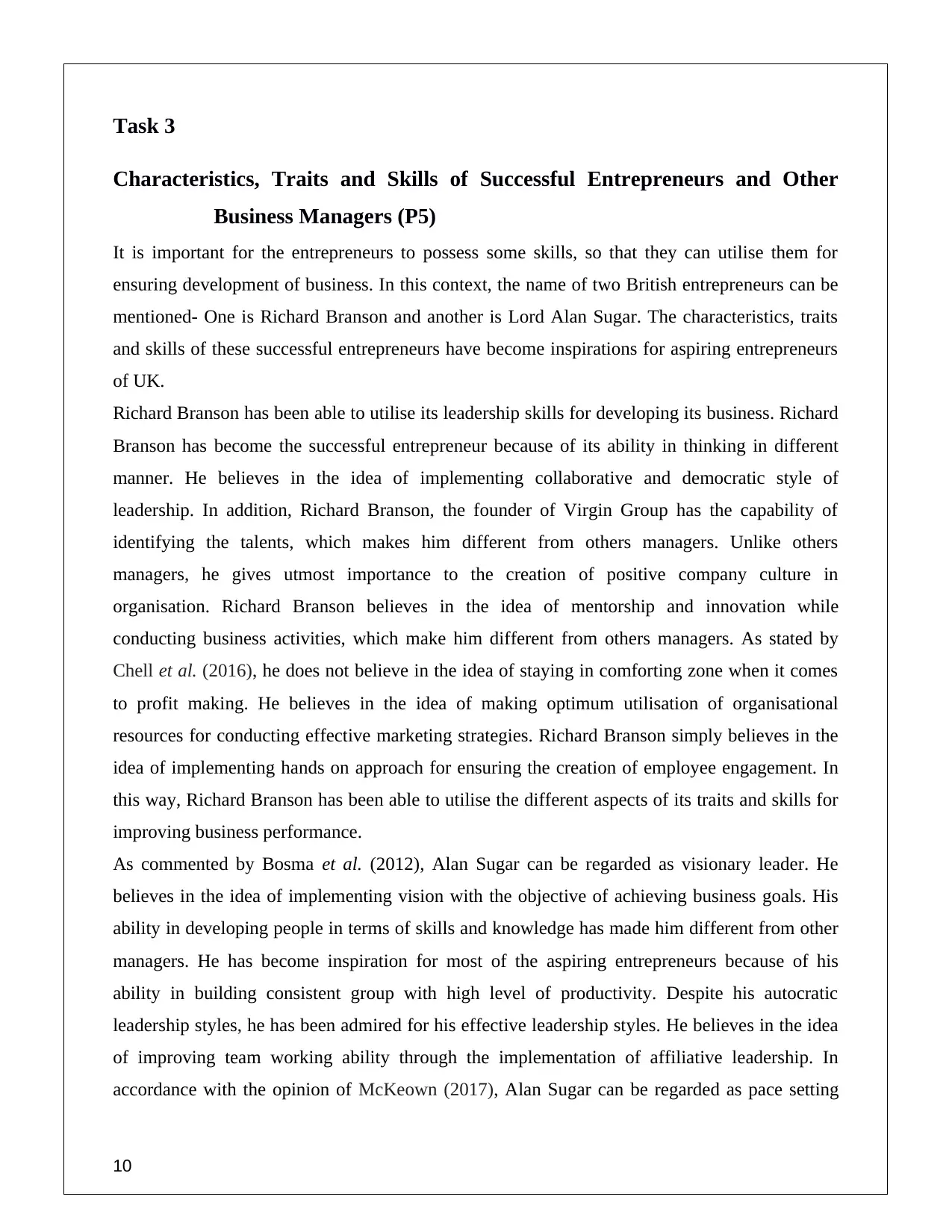
Task 3
Characteristics, Traits and Skills of Successful Entrepreneurs and Other
Business Managers (P5)
It is important for the entrepreneurs to possess some skills, so that they can utilise them for
ensuring development of business. In this context, the name of two British entrepreneurs can be
mentioned- One is Richard Branson and another is Lord Alan Sugar. The characteristics, traits
and skills of these successful entrepreneurs have become inspirations for aspiring entrepreneurs
of UK.
Richard Branson has been able to utilise its leadership skills for developing its business. Richard
Branson has become the successful entrepreneur because of its ability in thinking in different
manner. He believes in the idea of implementing collaborative and democratic style of
leadership. In addition, Richard Branson, the founder of Virgin Group has the capability of
identifying the talents, which makes him different from others managers. Unlike others
managers, he gives utmost importance to the creation of positive company culture in
organisation. Richard Branson believes in the idea of mentorship and innovation while
conducting business activities, which make him different from others managers. As stated by
Chell et al. (2016), he does not believe in the idea of staying in comforting zone when it comes
to profit making. He believes in the idea of making optimum utilisation of organisational
resources for conducting effective marketing strategies. Richard Branson simply believes in the
idea of implementing hands on approach for ensuring the creation of employee engagement. In
this way, Richard Branson has been able to utilise the different aspects of its traits and skills for
improving business performance.
As commented by Bosma et al. (2012), Alan Sugar can be regarded as visionary leader. He
believes in the idea of implementing vision with the objective of achieving business goals. His
ability in developing people in terms of skills and knowledge has made him different from other
managers. He has become inspiration for most of the aspiring entrepreneurs because of his
ability in building consistent group with high level of productivity. Despite his autocratic
leadership styles, he has been admired for his effective leadership styles. He believes in the idea
of improving team working ability through the implementation of affiliative leadership. In
accordance with the opinion of McKeown (2017), Alan Sugar can be regarded as pace setting
10
Characteristics, Traits and Skills of Successful Entrepreneurs and Other
Business Managers (P5)
It is important for the entrepreneurs to possess some skills, so that they can utilise them for
ensuring development of business. In this context, the name of two British entrepreneurs can be
mentioned- One is Richard Branson and another is Lord Alan Sugar. The characteristics, traits
and skills of these successful entrepreneurs have become inspirations for aspiring entrepreneurs
of UK.
Richard Branson has been able to utilise its leadership skills for developing its business. Richard
Branson has become the successful entrepreneur because of its ability in thinking in different
manner. He believes in the idea of implementing collaborative and democratic style of
leadership. In addition, Richard Branson, the founder of Virgin Group has the capability of
identifying the talents, which makes him different from others managers. Unlike others
managers, he gives utmost importance to the creation of positive company culture in
organisation. Richard Branson believes in the idea of mentorship and innovation while
conducting business activities, which make him different from others managers. As stated by
Chell et al. (2016), he does not believe in the idea of staying in comforting zone when it comes
to profit making. He believes in the idea of making optimum utilisation of organisational
resources for conducting effective marketing strategies. Richard Branson simply believes in the
idea of implementing hands on approach for ensuring the creation of employee engagement. In
this way, Richard Branson has been able to utilise the different aspects of its traits and skills for
improving business performance.
As commented by Bosma et al. (2012), Alan Sugar can be regarded as visionary leader. He
believes in the idea of implementing vision with the objective of achieving business goals. His
ability in developing people in terms of skills and knowledge has made him different from other
managers. He has become inspiration for most of the aspiring entrepreneurs because of his
ability in building consistent group with high level of productivity. Despite his autocratic
leadership styles, he has been admired for his effective leadership styles. He believes in the idea
of improving team working ability through the implementation of affiliative leadership. In
accordance with the opinion of McKeown (2017), Alan Sugar can be regarded as pace setting
10
Paraphrase This Document
Need a fresh take? Get an instant paraphrase of this document with our AI Paraphraser
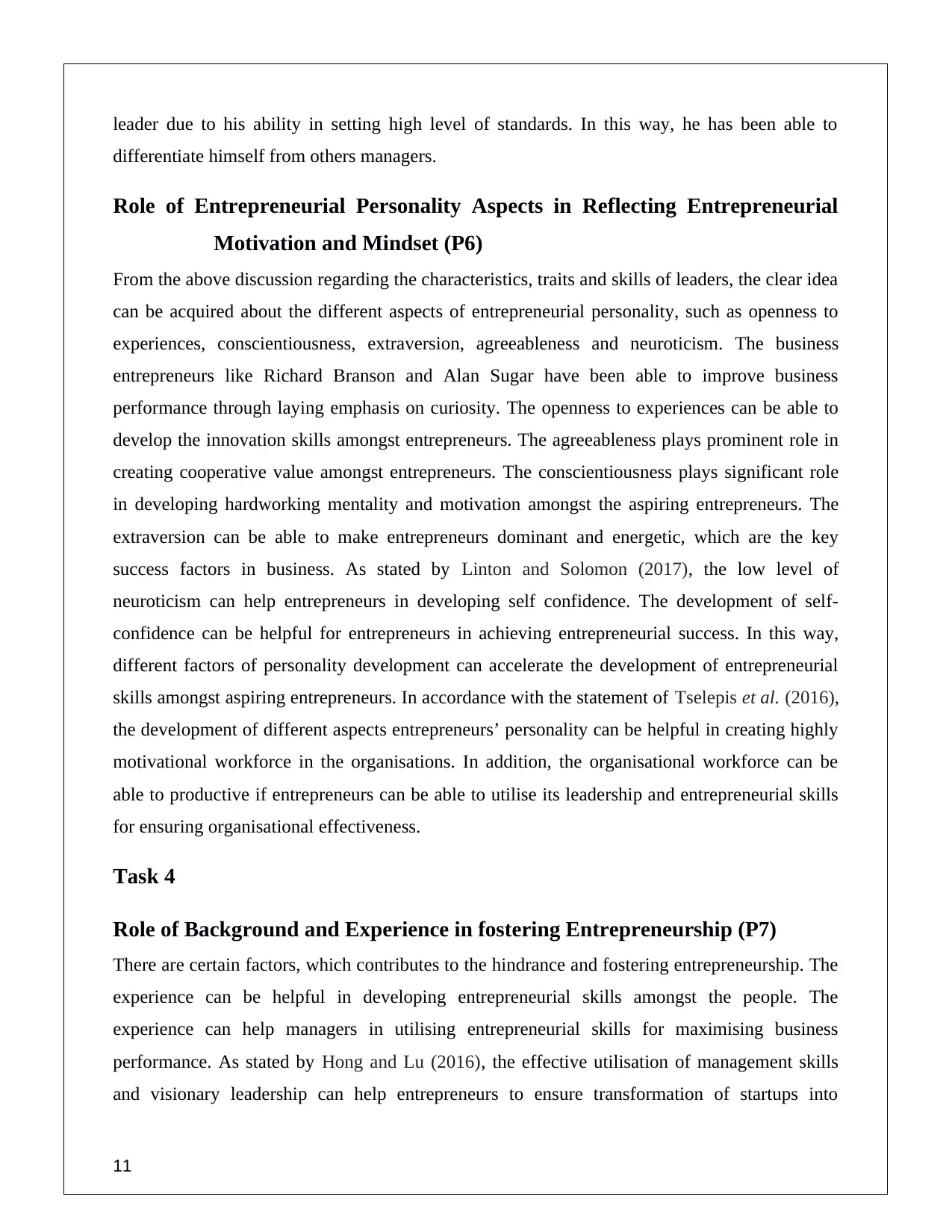
leader due to his ability in setting high level of standards. In this way, he has been able to
differentiate himself from others managers.
Role of Entrepreneurial Personality Aspects in Reflecting Entrepreneurial
Motivation and Mindset (P6)
From the above discussion regarding the characteristics, traits and skills of leaders, the clear idea
can be acquired about the different aspects of entrepreneurial personality, such as openness to
experiences, conscientiousness, extraversion, agreeableness and neuroticism. The business
entrepreneurs like Richard Branson and Alan Sugar have been able to improve business
performance through laying emphasis on curiosity. The openness to experiences can be able to
develop the innovation skills amongst entrepreneurs. The agreeableness plays prominent role in
creating cooperative value amongst entrepreneurs. The conscientiousness plays significant role
in developing hardworking mentality and motivation amongst the aspiring entrepreneurs. The
extraversion can be able to make entrepreneurs dominant and energetic, which are the key
success factors in business. As stated by Linton and Solomon (2017), the low level of
neuroticism can help entrepreneurs in developing self confidence. The development of self-
confidence can be helpful for entrepreneurs in achieving entrepreneurial success. In this way,
different factors of personality development can accelerate the development of entrepreneurial
skills amongst aspiring entrepreneurs. In accordance with the statement of Tselepis et al. (2016),
the development of different aspects entrepreneurs’ personality can be helpful in creating highly
motivational workforce in the organisations. In addition, the organisational workforce can be
able to productive if entrepreneurs can be able to utilise its leadership and entrepreneurial skills
for ensuring organisational effectiveness.
Task 4
Role of Background and Experience in fostering Entrepreneurship (P7)
There are certain factors, which contributes to the hindrance and fostering entrepreneurship. The
experience can be helpful in developing entrepreneurial skills amongst the people. The
experience can help managers in utilising entrepreneurial skills for maximising business
performance. As stated by Hong and Lu (2016), the effective utilisation of management skills
and visionary leadership can help entrepreneurs to ensure transformation of startups into
11
differentiate himself from others managers.
Role of Entrepreneurial Personality Aspects in Reflecting Entrepreneurial
Motivation and Mindset (P6)
From the above discussion regarding the characteristics, traits and skills of leaders, the clear idea
can be acquired about the different aspects of entrepreneurial personality, such as openness to
experiences, conscientiousness, extraversion, agreeableness and neuroticism. The business
entrepreneurs like Richard Branson and Alan Sugar have been able to improve business
performance through laying emphasis on curiosity. The openness to experiences can be able to
develop the innovation skills amongst entrepreneurs. The agreeableness plays prominent role in
creating cooperative value amongst entrepreneurs. The conscientiousness plays significant role
in developing hardworking mentality and motivation amongst the aspiring entrepreneurs. The
extraversion can be able to make entrepreneurs dominant and energetic, which are the key
success factors in business. As stated by Linton and Solomon (2017), the low level of
neuroticism can help entrepreneurs in developing self confidence. The development of self-
confidence can be helpful for entrepreneurs in achieving entrepreneurial success. In this way,
different factors of personality development can accelerate the development of entrepreneurial
skills amongst aspiring entrepreneurs. In accordance with the statement of Tselepis et al. (2016),
the development of different aspects entrepreneurs’ personality can be helpful in creating highly
motivational workforce in the organisations. In addition, the organisational workforce can be
able to productive if entrepreneurs can be able to utilise its leadership and entrepreneurial skills
for ensuring organisational effectiveness.
Task 4
Role of Background and Experience in fostering Entrepreneurship (P7)
There are certain factors, which contributes to the hindrance and fostering entrepreneurship. The
experience can be helpful in developing entrepreneurial skills amongst the people. The
experience can help managers in utilising entrepreneurial skills for maximising business
performance. As stated by Hong and Lu (2016), the effective utilisation of management skills
and visionary leadership can help entrepreneurs to ensure transformation of startups into
11
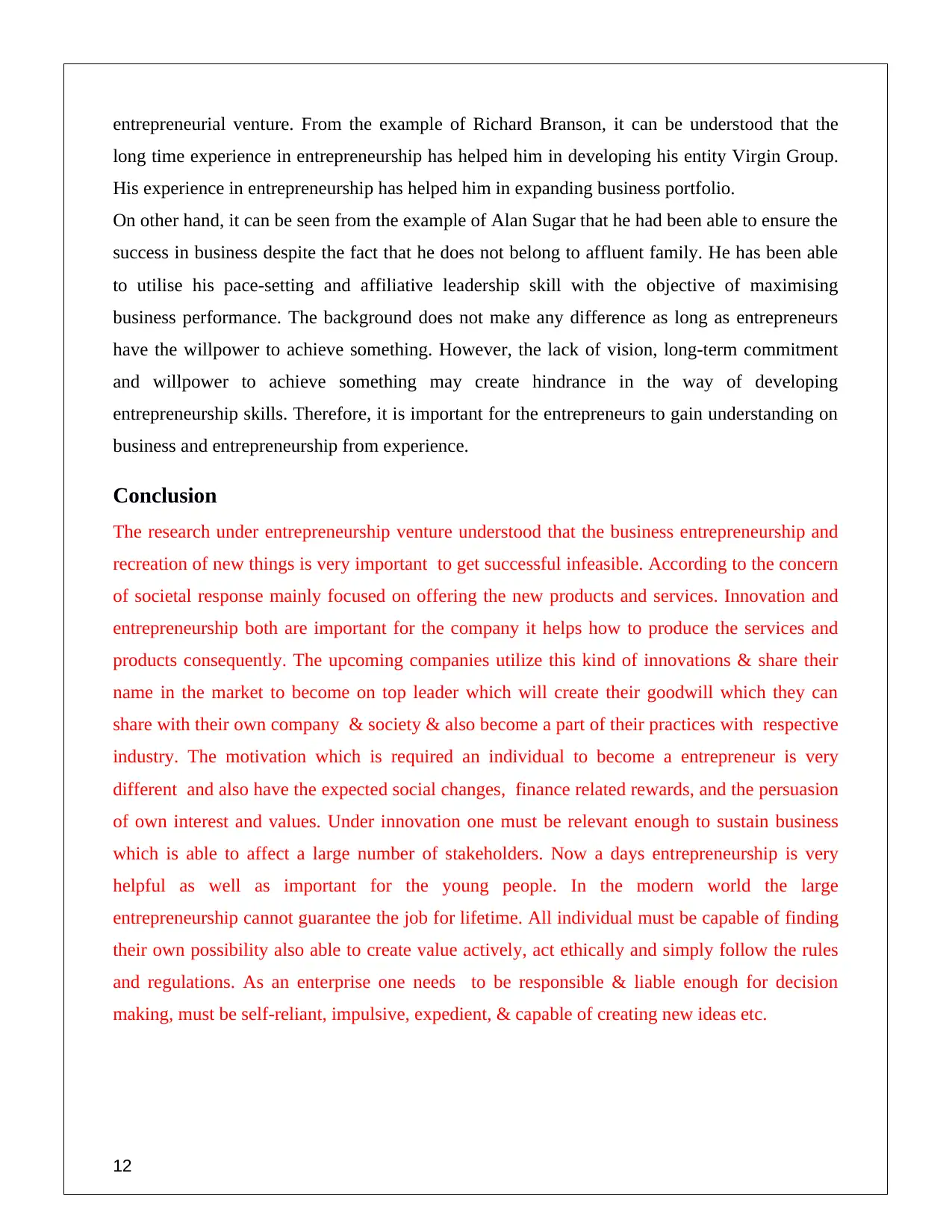
entrepreneurial venture. From the example of Richard Branson, it can be understood that the
long time experience in entrepreneurship has helped him in developing his entity Virgin Group.
His experience in entrepreneurship has helped him in expanding business portfolio.
On other hand, it can be seen from the example of Alan Sugar that he had been able to ensure the
success in business despite the fact that he does not belong to affluent family. He has been able
to utilise his pace-setting and affiliative leadership skill with the objective of maximising
business performance. The background does not make any difference as long as entrepreneurs
have the willpower to achieve something. However, the lack of vision, long-term commitment
and willpower to achieve something may create hindrance in the way of developing
entrepreneurship skills. Therefore, it is important for the entrepreneurs to gain understanding on
business and entrepreneurship from experience.
Conclusion
The research under entrepreneurship venture understood that the business entrepreneurship and
recreation of new things is very important to get successful infeasible. According to the concern
of societal response mainly focused on offering the new products and services. Innovation and
entrepreneurship both are important for the company it helps how to produce the services and
products consequently. The upcoming companies utilize this kind of innovations & share their
name in the market to become on top leader which will create their goodwill which they can
share with their own company & society & also become a part of their practices with respective
industry. The motivation which is required an individual to become a entrepreneur is very
different and also have the expected social changes, finance related rewards, and the persuasion
of own interest and values. Under innovation one must be relevant enough to sustain business
which is able to affect a large number of stakeholders. Now a days entrepreneurship is very
helpful as well as important for the young people. In the modern world the large
entrepreneurship cannot guarantee the job for lifetime. All individual must be capable of finding
their own possibility also able to create value actively, act ethically and simply follow the rules
and regulations. As an enterprise one needs to be responsible & liable enough for decision
making, must be self-reliant, impulsive, expedient, & capable of creating new ideas etc.
12
long time experience in entrepreneurship has helped him in developing his entity Virgin Group.
His experience in entrepreneurship has helped him in expanding business portfolio.
On other hand, it can be seen from the example of Alan Sugar that he had been able to ensure the
success in business despite the fact that he does not belong to affluent family. He has been able
to utilise his pace-setting and affiliative leadership skill with the objective of maximising
business performance. The background does not make any difference as long as entrepreneurs
have the willpower to achieve something. However, the lack of vision, long-term commitment
and willpower to achieve something may create hindrance in the way of developing
entrepreneurship skills. Therefore, it is important for the entrepreneurs to gain understanding on
business and entrepreneurship from experience.
Conclusion
The research under entrepreneurship venture understood that the business entrepreneurship and
recreation of new things is very important to get successful infeasible. According to the concern
of societal response mainly focused on offering the new products and services. Innovation and
entrepreneurship both are important for the company it helps how to produce the services and
products consequently. The upcoming companies utilize this kind of innovations & share their
name in the market to become on top leader which will create their goodwill which they can
share with their own company & society & also become a part of their practices with respective
industry. The motivation which is required an individual to become a entrepreneur is very
different and also have the expected social changes, finance related rewards, and the persuasion
of own interest and values. Under innovation one must be relevant enough to sustain business
which is able to affect a large number of stakeholders. Now a days entrepreneurship is very
helpful as well as important for the young people. In the modern world the large
entrepreneurship cannot guarantee the job for lifetime. All individual must be capable of finding
their own possibility also able to create value actively, act ethically and simply follow the rules
and regulations. As an enterprise one needs to be responsible & liable enough for decision
making, must be self-reliant, impulsive, expedient, & capable of creating new ideas etc.
12
⊘ This is a preview!⊘
Do you want full access?
Subscribe today to unlock all pages.

Trusted by 1+ million students worldwide
1 out of 15
Related Documents
Your All-in-One AI-Powered Toolkit for Academic Success.
+13062052269
info@desklib.com
Available 24*7 on WhatsApp / Email
![[object Object]](/_next/static/media/star-bottom.7253800d.svg)
Unlock your academic potential
Copyright © 2020–2026 A2Z Services. All Rights Reserved. Developed and managed by ZUCOL.




